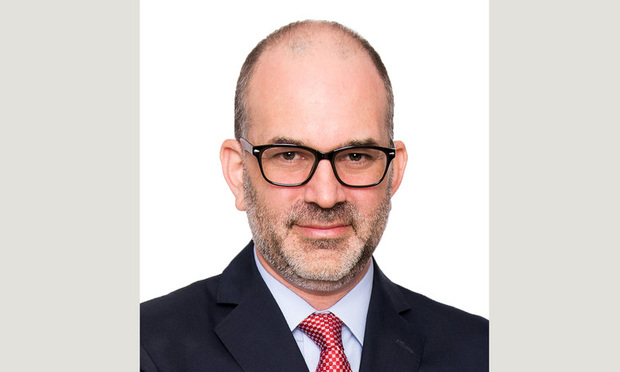Bankruptcy Partner From Greenberg Traurig Moves Back to Thompson Hine
Sean Gordon was introduced to bankruptcy law as a legal aid volunteer in Broward County.
July 24, 2019 at 04:28 PM
3 minute read
The original version of this story was published on Daily Report
 Sean Gordon, Thompson Hine
Sean Gordon, Thompson Hine
Sean Gordon has returned to Thompson Hine as a partner in its bankruptcy practice after a nine-year hiatus at Greenberg Traurig.
“There's a buzz going on at the Atlanta office. It's been expanding rapidly, and I'm excited to be a part of that,” Gordon said.
Thompson Hine has been on a growth push in Atlanta. Gordon is the fourth partner to join the Cleveland-based firm's Atlanta office this year, taking it it 30 attorneys. Labor and employment duo John Wymer and Bryan Stillwagon joined from Colorado-based Sherman & Howard in January, and trial lawyer Marla Butler joined from Robbins Kaplan in May.
Tim McDonald, Thompson Hines' Atlanta managing partner, called Gordon an important strategic addition to the office. “Sean originally helped expand Thompson Hine's insolvency and bankruptcy litigation practice to the Southeast and now provides additional experience at the local level,” McDonald said in a statement.
Gordon spent the first nine years of his career at Thompson Hine, joining the bankruptcy practice in the firm's Cleveland headquarters in 2001 after law school at Case Western Reserve University.
At that point, Gordon said he was already set on bankruptcy law. He volunteered with the Legal Aid Service of Broward County before law school and was assigned to its housing unit, where he screened potential clients for Chapter 7 and Chapter 13 bankruptcies.
“I really loved the bankruptcy world,” he said. “I thought it was fascinating that you could help people in financial trouble to get relief.”
Gordon and his family moved to Atlanta in 2007 after Thompson Hine opened its office, and he joined Greenberg Traurig in 2010 after the recession hit.
Gordon said the main reason he returned to Thompson Hine was because of the firm's push to “provide innovation, value and transparency” to its clients, most notably through its investment in SmartPaTH, its proprietary approach to legal project management.
“All firms look at data on a larger-scale level, but I think this is very unique to Thompson Hine,” he said. “It includes data analytics and other tools that help clients budget their matters and reach targeted goals.” The ability to track all steps of their matters helps clients make strategic decisions about next steps and cut down on legal costs, Gordon said.
“I know everyone here,” he added, noting he started his career working with Curtis Tuggle, who heads Thompson Hine's bankruptcy, restructuring and creditors' rights practice.
Gordon said he brought clients to Thompson Hine but declined to name them. He said most are banks as well as bankruptcy trustees and hedge funds. He said his bankruptcy practice is national, but he handles a lot of real estate valuation disputes as part of foreclosure-related litigation in Georgia. During the Great Recession, he estimated he handled 70 to 80 such cases.
Bankruptcy is often considered a countercyclical practice, but Gordon said that even in good times, companies “need bankruptcy assistance,” and “it can be credit issues or operational issues that lead to bankruptcy filings even in the best of times.”
This content has been archived. It is available through our partners, LexisNexis® and Bloomberg Law.
To view this content, please continue to their sites.
Not a Lexis Subscriber?
Subscribe Now
Not a Bloomberg Law Subscriber?
Subscribe Now
NOT FOR REPRINT
© 2025 ALM Global, LLC, All Rights Reserved. Request academic re-use from www.copyright.com. All other uses, submit a request to [email protected]. For more information visit Asset & Logo Licensing.
You Might Like
View All
Holland & Knight Hires Former Davis Wright Tremaine Managing Partner in Seattle
3 minute read


Local Boutique Expands Significantly, Hiring Litigator Who Won $63M Verdict Against City of Miami Commissioner
3 minute readTrending Stories
- 1We the People?
- 2New York-Based Skadden Team Joins White & Case Group in Mexico City for Citigroup Demerger
- 3No Two Wildfires Alike: Lawyers Take Different Legal Strategies in California
- 4Poop-Themed Dog Toy OK as Parody, but Still Tarnished Jack Daniel’s Brand, Court Says
- 5Meet the New President of NY's Association of Trial Court Jurists
Who Got The Work
J. Brugh Lower of Gibbons has entered an appearance for industrial equipment supplier Devco Corporation in a pending trademark infringement lawsuit. The suit, accusing the defendant of selling knock-off Graco products, was filed Dec. 18 in New Jersey District Court by Rivkin Radler on behalf of Graco Inc. and Graco Minnesota. The case, assigned to U.S. District Judge Zahid N. Quraishi, is 3:24-cv-11294, Graco Inc. et al v. Devco Corporation.
Who Got The Work
Rebecca Maller-Stein and Kent A. Yalowitz of Arnold & Porter Kaye Scholer have entered their appearances for Hanaco Venture Capital and its executives, Lior Prosor and David Frankel, in a pending securities lawsuit. The action, filed on Dec. 24 in New York Southern District Court by Zell, Aron & Co. on behalf of Goldeneye Advisors, accuses the defendants of negligently and fraudulently managing the plaintiff's $1 million investment. The case, assigned to U.S. District Judge Vernon S. Broderick, is 1:24-cv-09918, Goldeneye Advisors, LLC v. Hanaco Venture Capital, Ltd. et al.
Who Got The Work
Attorneys from A&O Shearman has stepped in as defense counsel for Toronto-Dominion Bank and other defendants in a pending securities class action. The suit, filed Dec. 11 in New York Southern District Court by Bleichmar Fonti & Auld, accuses the defendants of concealing the bank's 'pervasive' deficiencies in regards to its compliance with the Bank Secrecy Act and the quality of its anti-money laundering controls. The case, assigned to U.S. District Judge Arun Subramanian, is 1:24-cv-09445, Gonzalez v. The Toronto-Dominion Bank et al.
Who Got The Work
Crown Castle International, a Pennsylvania company providing shared communications infrastructure, has turned to Luke D. Wolf of Gordon Rees Scully Mansukhani to fend off a pending breach-of-contract lawsuit. The court action, filed Nov. 25 in Michigan Eastern District Court by Hooper Hathaway PC on behalf of The Town Residences LLC, accuses Crown Castle of failing to transfer approximately $30,000 in utility payments from T-Mobile in breach of a roof-top lease and assignment agreement. The case, assigned to U.S. District Judge Susan K. Declercq, is 2:24-cv-13131, The Town Residences LLC v. T-Mobile US, Inc. et al.
Who Got The Work
Wilfred P. Coronato and Daniel M. Schwartz of McCarter & English have stepped in as defense counsel to Electrolux Home Products Inc. in a pending product liability lawsuit. The court action, filed Nov. 26 in New York Eastern District Court by Poulos Lopiccolo PC and Nagel Rice LLP on behalf of David Stern, alleges that the defendant's refrigerators’ drawers and shelving repeatedly break and fall apart within months after purchase. The case, assigned to U.S. District Judge Joan M. Azrack, is 2:24-cv-08204, Stern v. Electrolux Home Products, Inc.
Featured Firms
Law Offices of Gary Martin Hays & Associates, P.C.
(470) 294-1674
Law Offices of Mark E. Salomone
(857) 444-6468
Smith & Hassler
(713) 739-1250






